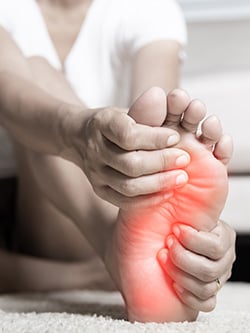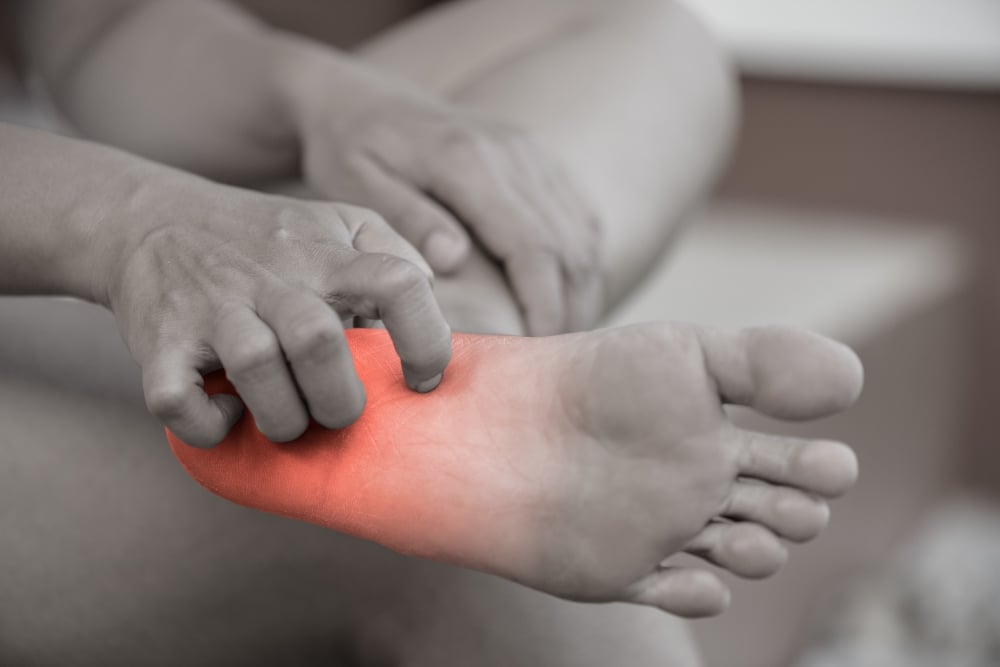Foot Health Awareness Month
April is Foot Health Awareness Month! This month aims to educate on how to maintain healthy feet. Foot Health is much more than just cleaning between your toes! This topic covers a variety of foot initiatives, such as encouraging our friends and family to wear the correct shoes, soaking your feet in Epsom salt when they are sore, and seeking help from a medical professional for any serious foot-related conditions.
Diabetes and Foot Care
Foot care is one essential topic for diabetics. Diabetes can cause damage to the nerves throughout the body, leading to a condition known as peripheral neuropathy. Neuropathy can lead to numbness in the affected area (often the legs and feet). As a result of the numbness, small injuries to the feet may go unnoticed and lead to more serious foot injuries such as calluses, blisters, sores, infections, and in some cases, even ulcers. Uncontrolled diabetes also impacts the body’s ability to heal “normally” due to poor circulation and a weakened immune system, which can cause even a small cut from shoes that are too tight to become a serious health issue.
Foot Health Best Practices
There are several easy tips and tricks that will go a long way in keeping your feet healthy:
Wear the correct shoes. Wearing comfortable shoes with arch support is vital, especially if you are someone who is on your feet a lot. Make sure your shoes are comfortable to walk in, and aren’t too big or too small.
Get new shoes when needed. If your shoes are worn, make it a point to purchase new ones. Many overwear their shoes and don’t swap them out when it’s time for new ones, leading to blisters and bunions.
Get foot massages or try reflexology. Foot massages or reflexology are two things that can make a big difference in your foot health! Both help to improve circulation, stimulate nerves, reduce stress, and decrease pain.
Keep your feet clean. Keep your feet clean, and cut your toenails regularly to avoid any painful ingrown toenails. Regularly use lotion on your feet to prevent dry, cracked skin.
Check your feet regularly. Check your feet and get to know what is normal vs. what is not normal for you. Oftentimes, people don’t feel cut in their feet, which can lead to infection or developing ulcers.
Get checkups. During your exam, ensure your provider checks your feet. If you notice any wounds or abnormalities, seek the help of a medical professional.
Foot health is extremely important for those living with neuropathy, specifically diabetic neuropathy. About half of all people with diabetes will develop diabetic neuropathy at some point in their life, and it is often left untreated. Over time, the nerves in diabetic patients become affected by high blood glucose levels. The excess glucose damages the walls of the small blood vessels that nurture nerves and injures the fragile coating that surrounds nerves. Symptoms of neuropathy are most common in the legs and feet and include pain, numbness, tingling, and weakness of the affected extremity. Patients experiencing neuropathy in their legs and feet may experience issues with walking, balancing, and even wearing shoes.
When left untreated, the pain in the legs and feet can get worse. Following this stage, if a patient does not seek treatment for their neuropathy, they will begin to lose all feeling, and their risk of recurrent wounds and ulcers will increase. Any small cut to the foot could lead to infection and even amputation in some cases.
Beyond Foot Care
Proper foot care is an essential first step to minimizing the complications associated with neuropathy. Conservative treatment methods for neuropathy, such as pain medication, physical therapy, laser therapy, and topical medications, may be helpful in alleviating pain. However, these treatments are short-term solutions and do not address the underlying cause of neuropathy.
Neuropathy surgery, such as that performed at The Institute for Advanced Reconstruction, addresses the underlying cause of the neuropathy symptoms. This minimally invasive procedure has been found to be successful in relieving the symptoms of neuropathy in up to 90 percent of well-selected patients. What are the benefits? Following surgery, patients experience not only a reduction in pain but also a restored sensation. By improving sensation, patients are at a decreased risk of developing chronic foot wounds often caused by diabetic neuropathy.
“Dr. Rose helped me so much, where I can walk and not have to walk on the sides of my feet. I can’t wait to walk on the beach again, which I love to do!” -Debbie Pavia, neuropathy patient of Dr. Michael Rose.






